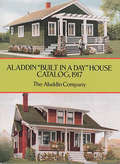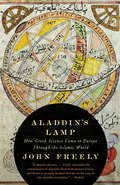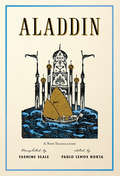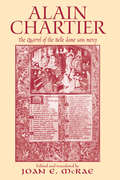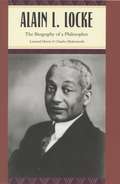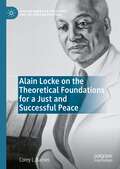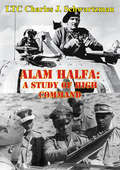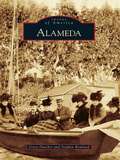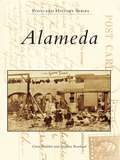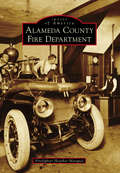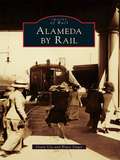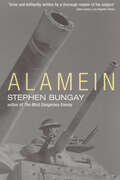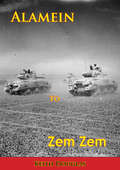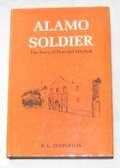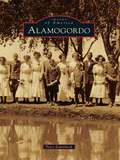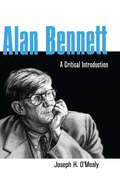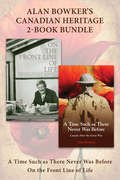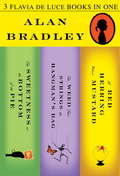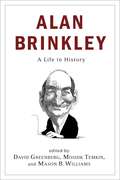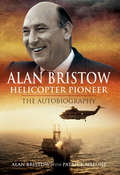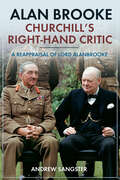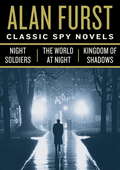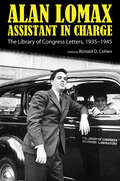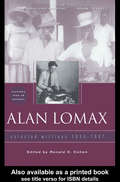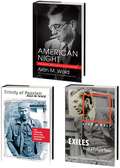- Table View
- List View
Aladdin "Built in a Day" House Catalog, 1917 (Dover Architecture)
by Aladdin CompanyDesigns for 60 homes, from a simple four-room cottage with a front porch to a comfortable two-story home with four bedrooms, a reception hall, and pantry. Shown in landscaped exteriors, floor plans, and overhead cutaway views. With detailed commentaries on each design.
Aladdin's Lamp
by John FreelyAladdin’s Lamp is the fascinating story of how ancient Greek philosophy and science began in the sixth century B.C. and, during the next millennium, spread across the Greco-Roman world, producing the remarkable discoveries and theories of Thales, Pythagoras, Hippocrates, Plato, Aristotle, Euclid, Archimedes, Galen, Ptolemy, and many others. John Freely explains how, as the Dark Ages shrouded Europe, scholars in medieval Baghdad translated the works of these Greek thinkers into Arabic, spreading their ideas throughout the Islamic world from Central Asia to Spain, with many Muslim scientists, most notably Avicenna, Alhazen, and Averroës, adding their own interpretations to the philosophy and science they had inherited. Freely goes on to show how, beginning in the twelfth century, these texts by Islamic scholars were then translated from Arabic into Latin, sparking the emergence of modern science at the dawn of the Renaissance, which climaxed in the Scientific Revolution of the seventeenth century.
Aladdin: A New Translation
by Paulo Lemos HortaA dynamic French-Syrian translator, lauded for her lively poetic voice, tackles the enchanted world of Aladdin in this sparkling new translation. Long defined by popular film adaptations that have reductively portrayed Aladdin as a simplistic rags-to-riches story for children, this work of dazzling imagination—and occasionally dark themes—finally comes to vibrant new life. “In the capital of one of China’s vast and wealthy kingdoms,” begins Shahrazad— the tale’s imperiled-yet-ingenious storyteller—there lived Aladdin, a rebellious fifteen-year-old who falls prey to a double-crossing sorcerer and is ultimately saved by the ruse of a princess. One of the best-loved folktales of all time, Aladdin has been capturing the imagination of readers, illustrators, and filmmakers since an eighteenth-century French publication first added the tale to The Arabian Nights. Yet, modern English translators have elided the story’s enchanting whimsy and mesmerizing rhythms. Now, translator Yasmine Seale and literary scholar Paulo Lemos Horta offer an elegant, eminently readable rendition of Aladdin in what is destined to be a classic for decades to come.
Alain Chartier: The Quarrel of the Belle Dame Sans Mercy (Routledge Medieval Texts #5)
by Joan E. McRaeBelle dame sans merci (Beautiful lady with no mercy) (1424) is not readily available in moden English translation elsewhere, making this an essential addition to any library with a medieval literature or French literature collection.
Alain L. Locke: Biography of a Philosopher
by Leonard Harris Charles MolesworthAlain L. Locke (1886-1954), in his famous 1925 anthology "The New Negro", declared that "the pulse of the Negro world has begun to beat in Harlem". Often called the father of the Harlem Renaissance, Locke had his finger directly on that pulse, promoting, influencing, and sparring. Leonard Harris and Charles Molesworth trace Locke's story through his Philadelphia upbringing, his undergraduate years at Harvard and his tenure as the first African American Rhodes Scholar. The heart of their narrative illuminates Locke's heady years in 1920s New York City and his forty-year career at Howard University, where he helped spearhead the adult education movement of the 1930s and wrote on topics ranging from the philosophy of value to the theory of democracy. Harris and Molesworth show that throughout this illustrious career -- despite a formal manner that many observers interpreted as elitist or distant -- Locke remained a warm and effective teacher and mentor, as well as a fierce champion of literature and art as means of breaking down barriers between communities. The multifaceted portrait that emerges from this engaging account effectively reclaims Locke's rightful place in the pantheon of America's most important minds.
Alain Locke on the Theoretical Foundations for a Just and Successful Peace (African American Philosophy and the African Diaspora)
by Corey L. BarnesAlain Locke is most known for his involvement in the Harlem Renaissance. However, he received his PhD in philosophy from Harvard University in 1918, and produced a very large corpus of philosophical work. His work shows him to have been a sophisticated philosopher who thought through practical and theoretical problems regarding the nature of cosmopolitanism, democracy, race, value, religion, art, and education. Although Locke’s philosophical work has been discussed in parts, there has been no theorizing about how his different philosophical commitments fit together. In this book Corey L. Barnes begins to systematize Locke’s philosophical thought, showing how his democratic theory, philosophy of race, and value theory are connected to and undergirded by a commitment to cosmopolitanism. In so doing, Barnes unearths aspects of Locke’s thought—for example, his economic thinking—that have not been accorded attention and reimagines parts of his work about which have been theorized, all while bringing Locke into current debates about each subject.
Alam Halfa: A Study Of High Command
by LTC Charles J. SchwartzmanIn recent years the army has adopted rigorous programs which evaluate the competence and leadership abilities of its combat leaders. For the first time, senior leaders are being formally evaluated as they command their units in the simulated combat environment provided by the Battle Combat Training Program (BCTP). Preparation for BCTP will require introspection and thought as the commander develops his concept of the operation and establishes the vision to guide his organization. This paper can assist the commander in this effort by challenging his thought processes and by provoking him to find answers to the problems of command. It describes the Battle of Alam Halfa which was fought in North Africa in 1942. It is appropriate because its major participant, General Bernard Montgomery, had a uniquely "BCTP-type" mission. He was expected to assume command, imprint his methods and procedures on his army, and fight a major battle within a two-week period. The study includes an overview of the following: the situation in North Africa during the summer of 1942; the steps Montgomery took to prepare his force for battle; and the fighting itself. It concludes with an analysis of the battle using the AirLand Battle imperatives.
Alameda
by Stephen Rowland Greta DutcherAlameda was once a peninsula of grassy fields and sandy beaches, separated from Oakland by a snaking estuary. A tidal canal made Alameda an island in 1902 and its waterfront became a major shipping port. Park Street's bay-windowed commercial buildings looked out on a prosperous city of streetcars and comfortable homes. Between the two world wars, Alameda's Neptune Beach resort and amusement park became the "Coney Island of the West," eventually boasting a Moorish entrance tower on Webster Street, a stadium, two swimming pools, a high dive, and a roller coaster called the "Whoopie." Alameda's strategic location made its "airdrome" the busiest in the world in the 1930s and eventually attracted a U.S. Coast Guard base, known as Government Island, and the Alameda Naval Air Station.
Alameda (Postcard History Series)
by Stephen Rowland Greta DutcherAlameda was once a peninsula of grassy fields and sandy beaches, separated from Oakland by a snaking estuary. A tidal canal made Alameda an island in 1902 and its waterfront became a major shipping port. Park Street�s bay-windowed commercial buildings looked out on a prosperous city of streetcars and comfortable homes. Between the two world wars, Alameda�s Neptune Beach resort and amusement park became the �Coney Island of the West,� eventually boasting a Moorish entrance tower on Webster Street, a stadium, two swimming pools, a high dive, and a roller coaster called the �Whoopie.� Alameda�s strategic location made its �airdrome� the busiest in the world in the 1930s and eventually attracted a U.S. Coast Guard base, known as Government Island, and the Alameda Naval Air Station.
Alameda County Fire Department (Images of America)
by Firefighter Heather MarquesAlameda County spans from the shores of the San Francisco Bay to the golden inland hills. Alameda County Fire Department (ACFD) is comprised of multiple consolidated agencies that began joining forces and sharing resources in 1993. Protecting unincorporated county land as well as Ashland, Cherryland, San Lorenzo, Castro Valley, San Leandro, Dublin, Union City, Newark, Emeryville, and the National Laboratories at Livermore and Berkeley, ACFD serves over 500 square miles and 330,000 citizens. This legacy stretches back 140 years, recalling the shared experiences of bucket brigades, teams of horses pulling steam-engine pumpers down muddy roads, the advent of motorized apparatus, and the days when school boys would be pulled from class to ride tailboard to fight blazes in the hills. These agencies have sent soldiers to two world wars, survived massive earthquakes, fought catastrophic wildfires, and touched the lives of Bay Area citizens for over a century. The ACFD is the sum of its many unique parts, which together form a premier, all-risk fire department.
Alameda by Rail
by Bruce Singer Grant UteAcross the great bay from San Francisco, the city of Alameda evolved into an island hometown of fine Victorian and Craftsman architecture and a port containing a naval air station, shipbuilding center, and the winter home of the long-gone Alaska Packers fleet of "tall ships." But Alameda also was a busy railroad town. In 1864, a passenger railroad with a ferry connection created a commute to San Francisco. In 1869, the city became the first Bay Area terminus of the Transcontinental Railroad. Alameda became an island because a railroad allowed construction crews to dig a tidal canal, separating it from Oakland in 1902. Later generations rode steam, then electric, trains to a grand ferry pier where ornate watercraft guided them the 20 minutes to San Francisco. An auto tube, and later the San Francisco Oakland Bay Bridge, hastened the demise of ferry, then rail, operations before World War II.
Alamein
by Stephen BungayFrom the author of The Most Dangerous Enemy, a study of the history, strategy, and logistics of the pivotal World War II battles at El Alamein.El Alamein was the Second World War land battle Britain had to win. By the summer of 1942 Rommel’s German forces were threatening to sweep through the Western Desert and drive on to the Suez Canal, and Britain desperately needed a victory.In July, Rommel was halted. Then, in October, after twelve days of attritional fighting, Montgomery’s Eighth Army broke through the German and Italian lines at El Alamein. It was a turning-point in the war after which, in Churchill’s words, “we never had a defeat.”Stephen Bungay’s superbly readable narrative complements his definitive study of the Battle of Britain, The Most Dangerous Enemy, illuminating every aspect of this most famous episode of the Desert War, from the crucial logistics of keeping the distant armies supplied to the terror of battle in tormenting heat that was the soldier’s war.Praise for Alamein“Terse and brilliantly written by a thorough master of his subject.” —John Lukacs, Los Angeles Times“A brilliant balance between lucid analysis and piquant detail . . . masterly chapters.” —Lawrence James, Daily Mail (UK)“A broad and pacy overview in a short compass.” —Hew Strachan, Times Literary Supplement (UK)
Alamein to Zem Zem [Illustrated Edition]
by Keith DouglasIncludes the War in North Africa Illustration Pack - 112 photos/illustrations and 21 maps.Few records of war are a lucid, vivid and sensitively written as Keith Douglas' "Alamein to Zem Zem". The author himself was a man of great poetic gifts who had established himself as a leading light in the Oxford literary circles, tutored by no less a person than First World War veteran and acclaimed poet Edmund Blunden. A talent that did not outlast the war, killed in action in Normandy 1944, but his lasting legacy is contained in this exceptional book.Within days of the declaration of the Second World War Douglas had volunteered, chaffing at the bit to get at the Germans. Having passed out of the officer training course at Sandhurst, he was sent to the Middle East in 1941 to join his comrades in the Sherwood Foresters Yeomanry (a tank unit). He was disappointed to be given a staff appointment away from the fighting line; and during the Battle of El Alamein, he snapped and as he put it;"The battle of Alamein began on the 23rd of October, 1942. Six days afterwards I set out in direct disobedience of orders to rejoin my regiment. My batman was delighted with this manoeuvre. 'I like you, sir,' he said. 'You're shit or bust, you are.' This praise gratified me a lot."...and so began his odyssey began from the Alamein line to victory at Zem Zem. Critically acclaimed at the time of publication, and now widely regarded as a military classic."one of the very best prose accounts of fighting the last war."--Philip Toynbee, The Observer.
Alamo Soldier: The Story of Peaceful Mitchell, First Edition
by R. L. TempletonAlamo Soldier, The Story of Peaceful Mitchell is the true story of Napoleon Bonaparte Mitchell, the 17 year old long lean lad from Belvidere, Tennessee, the only man in the Alamo who didn't want to kill, didn't believe in violence, or the taking of a life. Too little is known of Napoleon Bonaparte Mitch¬ell. History records that he was one of the 13 men in Davy Crockett's Tennessee Mounted Volunteers who died defending the "Pallisade" wall of the Alamo.
Alamogordo
by Peter L. EidenbachIn 1898, the El Paso and Northeastern Railroad established New Mexico's first preplanned development community at Alamogordo. This city and its satellite communities of Tularosa, La Luz, and Cloudcroft are the only urban settlements in an area almost as large as Connecticut--the vast deserts and mountains of the Tularosa Basin are where people "climb for water and dig for wood." Alamogordo became the county seat after Otero County was created to modify the trial venue for the murder of Albert Fountain and his son Henry. West Texas ranching families moved into the Tularosa Basin in the 1880s and depended on ranching, farming, and tourism until World War II led to the creation of the Alamogordo Army Air Field (Holloman Air Force Base) and White Sands Proving Ground, the birthplace of the U.S. space and missile program. The first atomic explosion, Trinity, took place in White Sand's northwest corner on July 16, 1945. Col. John Stapp, pioneer of aerospace medicine, rode rocket sleds at the Holloman Test Track, leading to modern automotive seat belts.
Alan Bennett: A Critical Introduction (Studies in Modern Drama)
by Joseph O'MealyAlan Bennett is perhaps best known in the UK for the BBC production of his Talking Heads TV plays, while the rest of the world may recognize him for the film adaptation of his play, The Madness of King George. O'Mealy points out that Bennett is a social critic strongly influenced by Beckett and Swift, interested in depicting and analyzing the role playing of everyday life, a'la sociologist Ervin Goffman.
Alan Bowker's Canadian Heritage 2-Book Bundle: A Time Such as There Never Was Before / On the Front Line of Life
by Alan BowkerIn this two-book bundle, Alan Bowker sheds new light on two subjects with a surprising connection: the great Canadian writer Stephen Leacock and the rise of Canada on the world stage, which Leacock profiled with keen wit and observational skill. With Bowker as your guide, explore what it was really like to live through the great upheaval that pushed Canada to come into its own on the world stage. A Time Such as There Never Was Before Ottawa Book Award 2015 — Shortlisted The years after World War I were among the most tumultuous in Canadian history: a period of unremitting change, drama, and conflict. They were, in the words of Stephen Leacock, “a time such as there never was before.” The war had been a great crusade, and its end was supposed to bring a world made new. But the conflict had cost sixty thousand Canadian lives, with many more wounded, and had stirred up divisions in the young, diverse country. With Canada struggling to define itself, labour, farmers, business, the church, social reformers, and minorities all held extravagant hopes, irrational fears, and contradictory demands. Whose hopes would be realized, and whose dreams would end in disillusionment? Which changes would prove permanent and which would be transitory? A Time Such As There Never Was Before describes how this exciting period laid the foundation of the Canada we know today. On the Front Line of Life In the last decade of his life, Stephen Leacock turned to writing informal essays that blended humour with a conversational style and ripened wisdom to address issues he cared about most — education, literature, economics, Canada and its place in the world — and to confront the joys and sorrows of his own life. With an introduction that sets them in the context of his life, thoughts and times, these essays reveal a passionate, intelligent, personal Leacock, against a backdrop of Depression and war, finding hope and conveying the timeless message that only the human spirit can bring social justice, peace, and progress.
Alan Bradley's 3-Book Bundle (A Flavia de Luce Novel #1, 2, 3)
by Alan Bradley<P>New York Times bestselling author Alan Bradley has enchanted readers worldwide with one of the most award-winning mystery series ever. <P>Featuring the irresistible, incorrigible eleven-year-old Flavia de Luce, whom the Chicago Sun-Times called "a delightful, intrepid, acid-tongued new heroine," the family de Luce lives on the once glorious, now crumbling estate of Buckshaw, in the bucolic English hamlet of Bishop's Lacey, where murder happens more than it should and the brilliant amateur detective (and dedicated poison enthusiast) spends equal time dodging her older sisters and solving the most ghastly of crimes. <P>For a captivating introduction to Flavia's world, here's a convenient ebook bundle of the first three novels of this beguiling series: The Sweetness at the Bottom of the Pie, The Weed That Strings the Hangman's Bag, and A Red Herring Without Mustard. Includes an exclusive excerpt from Alan Bradley's forthcoming Flavia de Luce mystery, I Am Half-Sick of Shadows, on sale November 1, 2011
Alan Brinkley: A Life in History
by Williams David Greenberg Temkin Moshik Mason B.Few American historians of his generation have had as much influence in both the academic and popular realms as Alan Brinkley. His debut work, the National Book Award–winning Voices of Protest, launched a storied career that considered the full spectrum of American political life. His books give serious and original treatments of populist dissent, the role of mass media, the struggles of liberalism and conservatism, and the powers and limits of the presidency. A longtime professor at Harvard University and Columbia University, Brinkley has shaped the field of U.S. history for generations of students through his textbooks and his mentorship of some of today’s foremost historians. <P><P>Alan Brinkley: A Life in History brings together essays on his major works and ideas, as well as personal reminiscences from leading historians and thinkers beyond the academy whom Brinkley collaborated with, befriended, and influenced. Among the luminaries in this volume are the critic Frank Rich, the journalists Jonathan Alter and Nicholas Lemann, the biographer A. Scott Berg, and the historians Eric Foner and Lizabeth Cohen. Together, the seventeen essays that form this book chronicle the life and thought of a working historian, the development of historical scholarship in our time, and the role that history plays in our public life. At a moment when Americans are pondering the plight of their democracy, this volume offers a timely overview of a consummate student—and teacher—of the American political tradition.
Alan Bristow, Helicopter Pioneer: The Autobiography
by Patrick Malone Alan Bristow&“You could be forgiven for taking Bristow&’s story as the invention of an action thriller writer . . . One of the best flying books you&’ll ever read.&” —Pilot Magazine Alan Bristow was a truly remarkable man. As a merchant navy officer cadet during the war, he survived two sinkings, played a part in the evacuation of Rangoon and was credited with shooting down two Stukas in North Africa. He joined the Fleet Air Arm and trained as one of the first British helicopter pilots, becoming the first man to land a helicopter on a battleship and Westland&’s first helicopter test pilot. He flew in France, Holland, Algeria, Senegal and elsewhere, narrowly escaping many helicopter crashes before winning the Croix de Guerre evacuating wounded French soldiers in Indochina. For four years he flew for Aristotle Onassis&’s pirate whaling fleet in Antarctica before joining Douglas Bader and providing support services to oil drillers in the Persian Gulf. Out of that grew Bristow Helicopters Ltd, the largest helicopter company in the world outside America. Bristow&’s circle included the great helicopter pioneers such as Igor Sikorsky and Stan Hiller, test pilots like Harold Penrose and Bill Waterton, Sheiks and Shahs and political leaders, business giants like Lord Cayzer and Freddie Laker, and the author James Clavell, a lifelong friend whose book Whirlwind was a fictionalized account of Bristow&’s overnight evacuation of his people and helicopters from revolutionary Iran. Bristow and precipitated the Westland Affair when he made a takeover bid which eventually led to the resignation of Michael Heseltine and Leon Brittain, and almost to the downfall of Margaret Thatcher.&“Has all the ingredients of a bestselling novel.&” —Firetrench
Alan Brooke—Churchill's Right-Hand Critic: A Reappraisal of Lord Alanbrooke
by Andrew SangsterThis new biography of Churchill&’s top WWII advisor is &“an excellent book for anyone interested in military leadership&” (The NYMAS Review). Voted the greatest Briton of the twentieth century, Winston Churchill has long been credited with almost single-handedly leading his country to victory in World War II. But without Alan Brooke, a skilled tactician, at his side the outcome might well have been disastrous. Brooke, Chief of the Imperial General Staff, more often than not served as a brake on some of Churchill&’s more impetuous ideas. However, while Brooke&’s diaries reveal his fury with some of Churchill&’s decisions, they also reveal his respect and admiration for the wartime prime minister. In return Churchill must surely have considered Brooke one of his most difficult subordinates—but later wrote that he was &“fearless, formidable, articulate, and in the end convincing.&” As CIGS, Brooke was integral to coordination between the Allied forces, and so had to wrestle with the cultural strategy clash between the British and Americans. Comments in his diaries offer up his opinions of both his British and American military colleagues—his negative assessments of Mountbatten&’s ability, and acerbic comments on the difficult character of de Gaulle and the weaknesses of Eisenhower. Conversely, he was clearly overindulgent in the face of Montgomery&’s foibles. Brooke was often seen as a stern and humorless figure, but a study of his private life reveals a little-seen lighter side, a lifelong passion for birdwatching, and abiding love for his family. The two tragedies that befell his immediate family were a critical influence on his life. Andrew Sangster completes this new biography with a survey of the way various historians have assessed Brooke, explaining how he has lapsed into seeming obscurity in the years since his crucial part in the Allied victory in World War II.
Alan Furst's Classic Spy Novels 3-Book Bundle
by Alan FurstFrom Alan Furst, often compared to John le Carré, Graham Greene, and Eric Ambler, and praised as the best spy novelist ever, a trio of his classic works Furst, known for panoramic vision, deep authenticity, and a magnificent eye for historical detail, always sets his novels in the twilight world of Europe in the 1930s and first years of World War II, when the British, Russian, German, and many other spy services fought it out in the alleys and grand hotels of Paris, Berlin, and other cities on the Continent. The three classic spy novels in this "read all night" eBook bundle will transport you to the dark conflict between fascists, communists, and the people who fought back against them. Includes a preview of Alan Furst's new novel, Mission to Paris--with movie stars, elite spies, and German political warfare--on sale in June. "The writing in Mission to Paris, sentence after sentence, page after page, is dazzling. If you are a John le Carré fan, this is definitely a novel for you."--James Patterson "I am a huge fan of Alan Furst. Furst is the best in the business--the most talented espionage novelist of our generation."--Vince Flynn NIGHT SOLDIERS Bulgaria, 1934. A young man is murdered by the local fascists. His brother, Khristo Stoianev, is recruited into the NKVD, the Soviet secret intelligence service, and sent to Spain to serve in its civil war. Warned that he is about to become a victim of Stalin's purges, Khristo flees to Paris. Night Soldiers masterfully re-creates the European world of 1934-35: the struggle between Nazi Germany and Soviet Russia for Eastern Europe, the last desperate gaiety of the beau monde in 1937 Paris, and guerrilla operations with the French underground in 1944. Night Soldiers is a scrupulously researched panoramic novel, a work on a grand scale. THE WORLD AT NIGHT Paris, 1940. The civilized, upper-class life of film producer Jean Casson is derailed by the German occupation of Paris, but Casson learns that with enough money, compromise, and connections, one need not deny oneself the pleasures of Parisian life. Somewhere inside Casson, though, is a stubborn romantic streak. When he's offered the chance to take part in an operation of the British secret service, this idealism gives him the courage to say yes. A simple mission, but it goes wrong, and Casson realizes that he must gamble everything--his career, the woman he loves, life itself. Here is a brilliant re-creation of France--its spirit in the moment of defeat, its valor in the moment of rebirth. KINGDOM OF SHADOWS Paris, 1938. As Europe edges toward war, Nicholas Morath, an urbane former cavalry officer, spends his days working at the small advertising agency he owns and his nights in the bohemian circles of his Argentine mistress. But Morath has been recruited by his uncle, Count Janos Polanyi, a diplomat in the Hungarian legation, for operations against Hitler's Germany. It is Morath who does Polanyi's clandestine work, moving between the beach cafés of Juan-les-Pins and the forests of Ruthenia, from Czech fortresses in the Sudetenland to the private gardens of the déclassé royalty in Budapest. The web Polanyi spins for Morath is deep and complex and pits him against German intelligence officers, NKVD renegades, and Croat assassins in a shadow war of treachery and uncertain loyalties, a war that Hungary cannot afford to lose. Alan Furst is frequently compared with Eric Ambler, Graham Greene, and John le Carré, but Kingdom of Shadows is distinctive and entirely original. It is Furst at his very best.
Alan Lomax, Assistant in Charge: The Library of Congress Letters, 1935-1945 (American Made Music Series)
by Ronald D. CohenAlan Lomax (1915-2002) began working for the Archive of American Folk Song at the Library of Congress in 1936, first as a special and temporary assistant, then as the permanent Assistant in Charge, starting in June 1937, until he left in late 1942. He recorded such important musicians as Woody Guthrie, Muddy Waters, Aunt Molly Jackson, and Jelly Roll Morton. A reading and examination of his letters from 1935 to 1945 reveal someone who led an extremely complex, fascinating, and creative life, mostly as a public employee.While Lomax is noted for his field recordings, these collected letters, many signed "Alan Lomax, Assistant in Charge," are a trove of information until now available only at the Library of Congress. They make it clear that Lomax was very interested in the commercial hillbilly, race, and even popular recordings of the 1920s and after. These letters serve as a way of understanding Lomax's public and private life during some of his most productive and significant years. Lomax was one of the most stimulating and influential cultural workers of the twentieth century. Here he speaks for himself through his voluminous correspondence.
Alan Lomax: Selected Writings, 1934-1997 (American Made Music Ser.)
by Ronald D. CohenAlan Lomax is a legendary figure in American folk music circles. Although he published many books, hundreds of recordings and dozens of films, his contributions to popular and academic journals have never been collected. This collection of writings, introduced by Lomax's daughter Anna, reintroduces these essential writings. Drawing on the Lomax Archives in New York, this book brings together articles from the 30s onwards. It is divided into four sections, each capturing a distinct period in the development of Lomax's life and career: the original years as a collector and promoter; the period from 1950-58 when Lomax was recording thorughout Europe; the folk music revival years; and finally his work in academia.
Alan M. Wald's American Literary Left Trilogy, Omnibus E-Book
by Alan M. WaldOffered here for the first time as an Omnibus E-Book, this collection brings together Alan M. Wald's ground-breaking trilogy.American Night, the final volume of this unprecedented trilogy, brings Alan Wald's multigenerational history of Communist writers to a poignant climax. Using new research to explore the intimate lives of novelists, poets, and critics during the Cold War, Wald reveals a radical community longing for the rebirth of the social vision of the 1930s and struggling with a loss of moral certainty as the Communist worldview was being called into question. The resulting literature, Wald shows, is a haunting record of fracture and struggle linked by common structures of feeling, ones more suggestive of the "negative dialectics" of Theodor Adorno than the traditional social realism of the Left.The second of three volumes by Wald that track the political and personal lives of several generations of U.S. left-wing writers, Trinity of Passion carries forward the chronicle launched in Exiles from a Future Time. In this volume Wald delves into literary, emotional, and ideological trajectories of radical cultural workers in the era when the International Brigades fought in the Spanish Civil War (1936-39) and the United States battled in World War II (1941-45). Confronting questions about Jewish masculinity, racism at the core of liberal democracy, the corrosion of utopian dreams, and the thorny interaction between antifascism and Communism, Wald re-creates the intellectual and cultural landscape of a remarkable era.In Exiles from a Future Time, Wald offers a comprehensive history and reconsideration of the U.S. literary left in the mid-twentieth century. Recovering the central role Marxist-influenced writers played in fiction, poetry, theater, and literary criticism, he explores the lives and work of figures including Richard Wright, Muriel Rukeyser, Mike Gold, Claude McKay, Tillie Olsen, and Meridel Le Sueur.
